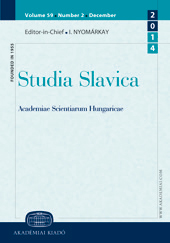Традиция плутовского романа в постмодернистском тексте русской прозы Венедикт Ерофеев: «Москва–Петушки»
The tradition of the picaresque novel in the postmodern text of Russian prose Venedikt Erofeev: "Moscow-Petushki"
Author(s): Ildikó RegécziSubject(s): Russian Literature, Theory of Literature
Published by: Akadémiai Kiadó
Keywords: picaresque novel; emptiness; allegoric journey; idiotism; strangeness;
Summary/Abstract: Many post-modern texts are inspired by the sub-genre of the picaresque novel. To refer to Gérard Genette’s category, it renews and reinvigorates tradition through imitation and indirect transformation. In texts dating from the second half of the 20th century, the picaresque novel mainly serves as a formal framework of playing with literariness. As post-modern space evokes the notion of emptiness or unfinished state (Mikhail Epstein), so does the journey itself become a shrivelling conceptual framework externally (when the emphasis is placed on natural, physical environment revealed in the wake of the journey) as well as internally (when the traveller turns inwards). It is exactly through reporting on the “ruined-state status” and taking an extensive journey in linguistic space that this framework can be “filled up.” Placing the emphasis on the text-oriented nature of Venichka’s character, this study will view her mainly from the perspective of the allegorical journey of Dostoevsky’s Prince Myshkin.
Journal: Studia Slavica Academiae Scientiarum Hungaricae
- Issue Year: 58/2013
- Issue No: 1
- Page Range: 147-160
- Page Count: 14
- Language: Russian
- Content File-PDF

